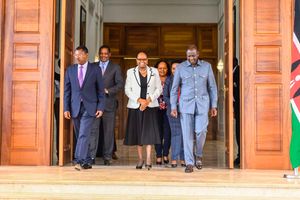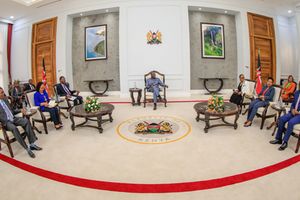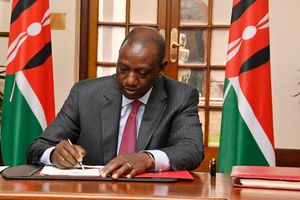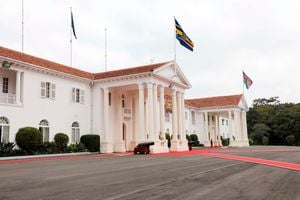
President William Ruto takes breakfast at a kibanda in Mandera Town during a past campaign trip.
We are 18 months into the KK regime. But it feels like a life time. Can we really survive for five years, a cabbie asked me this week? The unbearably high cost of living is making our lives miserable. For the majority of citizens, the economy has, well, gone bottom up. All the while, the government borrows to repay previous debt.
The most recent is the ongoing borrowing, to buy back the euro bond. Still, a cash crunch persists. And will as long as the government continues living beyond it means. It is spending more than they raise in taxes and able to borrow. Previous borrowing has caught up with them, and because successive roll-overs are at high interest rates, the problem will get worse.
The poor health of government finances has a big impact on the rest of the economy. It fuels negative sentiment. As a result, business confidence as well as consumer confidence are at an all-time low. People are not confident about economic management. That dampens economic prospects.
Government has responded in part by increasing interest rates, claiming that the increase will tame inflation. The increase is hurting business and consumers with higher finance costs, further dampening investments and consumption.
The escalating cost of living is a particularly troublesome. Prices are high, and rising higher, at a faster rate, now at around 7 per cent. From food to fuel, the cost of daily life is getting dear by the day.
There is a growing sense of frustration among Kenyans. And one can well understand. In a democracy, a citizen elects a government to avail themselves a way of solving problems such as escalating cost of living and unemployment. .
Some commentators have blamed politics, calling for the decoupling of politics from the management of the economy.
But politics and economics are two sides of the same coin. The economy is governed by laws created in Parliament. Business and private individuals operate in an environment created by government. What we are witnessing in the bond market demonstrates that politics is at the heart economic management.
The market has little confidence with what government is saying, and has responded by voting with their feet. You can discern this from the outcomes of the weekly treasury bills auction and bond. For the last 18 months all the bonds have been undersubscribed. This is happening while interest rates are rising significantly. For the first time in more than a decade the treasury bill rate is above 16 per cent.
How exactly is all this the result of politics? Citizens and market players observe behaviour of political leaders. They observe what leaders are saying, writing, and doing. For instance, the same government that has been saying there is no money, has presented a legal instrument showing their intention to increase the budget to Sh4 trillion. This means they will have to tax and borrow more.
Senior leadership is saying, because we have no money, and we are going to live within our means. But what we are observing is senior government leaders engaged in extravagant expenditure. For instance, is it necessary to go to every other country, once or twice per month, in order to sign memorandum of understanding?
People are observing that behavior, and seeing that the government is not walking the talk. Rather they are trying to hoodwink us.
What can citizens do? Citizens should stand up and call government to order. Government leaders must take actions that improve our lives.
Some have suggested that rather than criticizing, we should be giving government advice on what is to be done. Frankly, I am not convinced that what political leaders on the government side need are policy recommendations. These senior political and economic managers are not new to government.
First, the government is pursuing the wrong policy. Raising interest rate is a lazy way to control imported inflation.
Rather the government should reduce interest rates, and use other alternatives to control inflation. Ultimately food prices will only stabilize when we have sufficient food. We can either import, or grow it. The point of the short-term subsidies that this government removed was to support Kenyans while they waited for the rainy season to grow food.
Lower interest rates will assist government get out of the current debt distress, by rolling over existing debt at lower rates. Lower rates promote domestic production.
On the expenditure side, government must eliminate this don’t care, wasteful expenditure attitude. To do so, the tone at the top must be right. You can’t have senior leaders telling civil servants not to have tea, then hopping on a helicopter to go launching imaginary projects! Increasing the budget to Sh4.2 trillion certainly does not reduce the budget deficit.
But this government has its eyes focused on imaginary enemies within politics. It is firmly focused on blaming the previous regime, the Judiciary, the citizens and so on instead of daily economic management.
Citizens must say enough is enough.
@NdirituMuriithi is an economist










